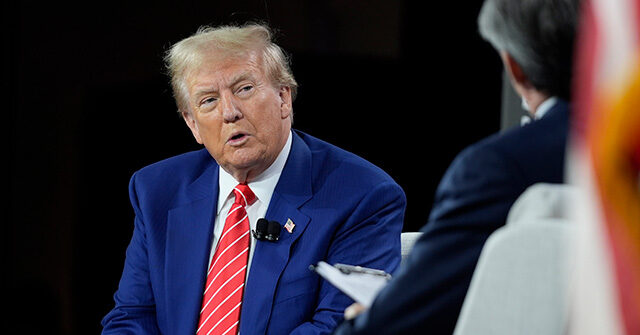In a recent interview with the Economic Club of Chicago, former President Donald Trump emphasized the perceived exploitation of the United States by its allies, particularly in the context of trade. Interviewer John Micklethwait challenged Trump on the effectiveness and ramifications of his tariff policies during their discussion, suggesting that although Trump had previously received credit for signaling a cold war against China, his approach could inadvertently weaken alliances rather than strengthen them. Traditionally, the American strategy has relied on uniting Western allies against common threats, and Micklethwait questioned whether current tariff policies would hinder that cohesive effort.
Trump ardently defended his position regarding tariffs, asserting that the detrimental impact of trade accords on the U.S. economy necessitated action. He claimed that the U.S. has been “taken advantage of” by its allies more significantly than by its adversaries, citing a substantial trade deficit with the European Union. Highlighting this concern, Trump illustrated his trade discussions with Japan’s former Prime Minister, Shinzo Abe, exemplifying how long-standing trade imbalances have existed and illustrating his perspective that previous administrations failed to negotiate adequately with nations that maintained favorable trade terms at the expense of American interests.
During the conversation, Trump recounted a specific dialogue with Abe, where he expressed incredulity over Japan’s trade practices, particularly regarding automobiles and agriculture. Notably, Trump pointed out that while Japan exported millions of cars to the U.S., American vehicles had been virtually excluded from the Japanese market. He emphasized the need for renegotiation, claiming that the prior trade deals were inherently unfavorable and underestimated America’s bargaining strength. Trump’s narrative painted a picture of a persistent struggle to rectify what he described as historically flawed agreements that left the U.S. economically disadvantaged.
These remarks epitomize Trump’s broader assertion that America’s trade deficits are a direct result of misguided strategies and insufficient political resolve. He posited that a “rational human being” would never have entered into such disadvantageous agreements in the first place. By reflecting on his presidency, Trump indicated that he had actively sought to amend what he viewed as detrimental global trade relationships, claiming that he exited several unfavorable deals to restore balance and fairness to international commerce.
Despite Trump’s unwavering assertions regarding inequality in trade, Micklethwait reiterated the geopolitical risks involved with imposing high tariffs on allies. He suggested that fostering division among traditional partners might stifle collective efforts against adversarial nations like China. This apprehension speaks to a longstanding debate about the implications of protectionist policies on international relations and the potential fallout on global stability, particularly in light of already tense geopolitical climates.
Overall, as the 2024 presidential election looms, Trump’s comments signal a continuation of his unique approach to foreign relations and trade policy—one that seeks to prioritize American interests aggressively, even if it means re-evaluating longstanding alliances. The discourse encapsulated the broader tension within American politics surrounding trade practices and foreign relations, reflecting divergent philosophies on how best to navigate an increasingly complex international landscape.

